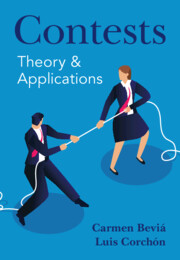Book contents
- Frontmatter
- Contents
- Illustrations
- Tables
- Preface
- Book Outline
- How to Use This Book
- Part I Foundations
- Part II Extensions
- Part III Applications
- 9 Contests in Other Environments: Draws, Large Contests, and Entry
- 10 Contests in Classical Problems: Divisionalization, Monopoly Welfare Losses, Coase Theorem, Voting
- 11 Contests, Institutions, Wars, and Economic Success
- 12 Contests: Social Welfare and Public Policy
- Summary: The Lost Continent – A Tale of Discovery
- References
- Index
9 - Contests in Other Environments: Draws, Large Contests, and Entry
from Part III - Applications
Published online by Cambridge University Press: 30 May 2024
- Frontmatter
- Contents
- Illustrations
- Tables
- Preface
- Book Outline
- How to Use This Book
- Part I Foundations
- Part II Extensions
- Part III Applications
- 9 Contests in Other Environments: Draws, Large Contests, and Entry
- 10 Contests in Classical Problems: Divisionalization, Monopoly Welfare Losses, Coase Theorem, Voting
- 11 Contests, Institutions, Wars, and Economic Success
- 12 Contests: Social Welfare and Public Policy
- Summary: The Lost Continent – A Tale of Discovery
- References
- Index
Summary
In Chapter 9, we explore extensions to the basic model, focusing on Draws, Large Contests, and Entry. Previous chapters assumed contests had one winner, with all others classified as losers. However, alternative outcomes like draws are possible. Draws occur when contestants have equal points or the outcome is inconclusive, as in certain soccer matches, chess games, or wars without a clear winner. They can also happen when prizes are shared or not awarded, like some Nobel Prizes or R&D contests. The chapter examines these extensions, along with equilibrium existence. We display an estimation of a CSF with draws with data from European soccer leagues which is close to one maximizing aggregate effort. In the section on Large Contests, we study scenarios where each contestant feels insignificant in a mass of contestants, such as in official exams, and address the contest as an individual decision problem. Lastly, we discuss complications when contestants can choose among alternative contests. Here, equilibrium existence is not always guaranteed but can occur in specific instances.
Information
- Type
- Chapter
- Information
- ContestsTheory and Applications, pp. 133 - 149Publisher: Cambridge University PressPrint publication year: 2024
